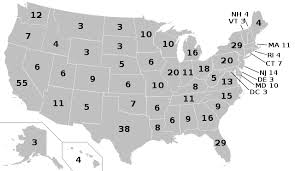Jayce Parrish explains how the electoral college votes
By Jayce Parrish

The electoral college is a system agreed upon by the founding fathers of the United States. The Constitutional Convention gathered to draft the U.S. Constitution the American people know today. The delegates of each colony could not agree upon whether the people should elect the president or if congress alone should be allowed that power. As a compromise, they agreed to create an electoral college system with delegates (called electors) representing each state based on population. California has the most electoral college votes with 55 electors because it has the highest population of all 50 states. Even The District of Columbia is allowed three electoral votes to represent the citizens residing there. Although most states electors are allowed to vote for whichever candidate they choose, seven states, including, Colorado, Delaware, Maryland, Montana, Vermont, Wyoming, and Nevada, have regulations requiring electors to vote according to the majority vote in the state. To be Commander-in-Chief, a candidate must receive at least 270 electoral college votes. If a candidate does not reach that 270-vote goal, then the House of Representatives votes for the President. Although it may seem like your vote doesn’t matter, it truly does. The electoral college was made to represent the voices of the people.
Over 4 million citizens, upset with the outcome of the recent election, signed a newly introduced petition to attempt at swaying electors in their upcoming official electoral vote. The petition is an attempt to persuade electors into voting against the choice of their state so Hillary Clinton, the Democratic candidate who won the popular vote, would win the electoral college. The electoral college does not formally cast its votes until December 19. Even in the states where electors are supposed to vote based on how the citizens voted, electors could still vote against the majority with a minimal fine. Clinton supporters are willing to pay the fines so that President- elect Donald Trump would never be inaugurated but Clinton would be instead. According to change.org, the petition has over four million signatures in favor of the electoral college going against the wishes of their state for the presidential candidate.
Some states have a party pledge where they are pledged to vote for the party that the majority of the state votes for. If the state voted mostly for republican candidate Donald Trump then they could potentially vote for another republican candidate. Then it would be possible that Trump would not have 270 electoral votes, so then Congress would be allowed to vote.








